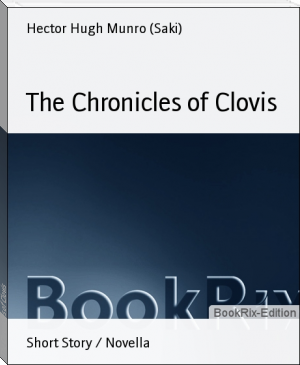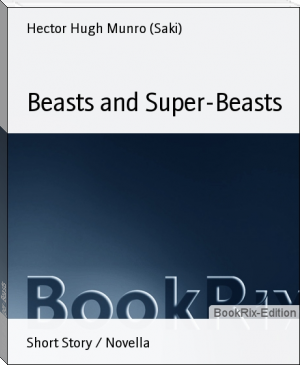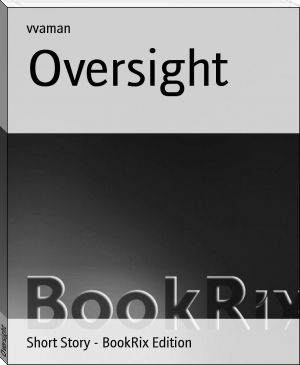The Toys of Peace, Hector Hugh Munro (Saki) [popular romance novels TXT] 📗

- Author: Hector Hugh Munro (Saki)
Book online «The Toys of Peace, Hector Hugh Munro (Saki) [popular romance novels TXT] 📗». Author Hector Hugh Munro (Saki)
breadth of the hall, and a few hisses made themselves heard. The Sheep tried to whittle down his remark, and the chairman unhesitatingly threw him over in his speech of thanks, but the damage was done.
"I'm afraid I lost touch with the audience rather over that remark," said the Sheep afterwards, with his apologetic smile abnormally developed.
"You lost us the election," said the chairman, and he proved a true prophet.
A month or so of winter sport seemed a desirable pick-me-up after the strenuous work and crowning discomfiture of the election. Rupert and Kathleen hied them away to a small Alpine resort that was just coming into prominence, and thither the Sheep followed them in due course, in his role of husband-elect. The wedding had been fixed for the end of March.
It was a winter of early and unseasonable thaws, and the far end of the local lake, at a spot where swift currents flowed into it, was decorated with notices, written in three languages, warning skaters not to venture over certain unsafe patches. The folly of approaching too near these danger spots seemed to have a natural fascination for the Sheep.
"I don't see what possible danger there can be," he protested, with his inevitable smile, when Rupert beckoned him away from the proscribed area; "the milk that I put out on my window-sill last night was frozen an inch deep."
"It hadn't got a strong current flowing through it," said Rupert; "in any case, there is not much sense in hovering round a doubtful piece of ice when there are acres of good ice to skate over. The secretary of the ice- committee has warned you once already."
A few minutes later Rupert heard a loud squeal of fear, and saw a dark spot blotting the smoothness of the lake's frozen surface. The Sheep was struggling helplessly in an ice-hole of his own making. Rupert gave one loud curse, and then dashed full tilt for the shore; outside a low stable building on the lake's edge he remembered having seen a ladder. If he could slide it across the ice-hole before the Sheep went under the rescue would be comparatively simple work. Other skaters were dashing up from a distance, and, with the ladder's help, they could get him out of his death-trap without having to trust themselves on the margin of rotten ice. Rupert sprang on to the surface of lumpy, frozen snow, and staggered to where the ladder lay. He had already lifted it when the rattle of a chain and a furious outburst of growls burst on his hearing, and he was dashed to the ground by a mass of white and tawny fur. A sturdy young yard-dog, frantic with the pleasure of performing his first piece of actice guardian service, was ramping and snarling over him, rendering the task of regaining his feet or securing the ladder a matter of considerable difficulty. When he had at last succeeded in both efforts he was just by a hair's-breadth too late to be of any use. The Sheep had definitely disappeared under the ice-rift.
Kathleen Athling and her husband stay the greater part of the year with Rupert, and a small Robbie stands in some danger of being idolised by a devoted uncle. But for twelve months of the year Rupert's most inseparable and valued companion is a sturdy tawny and white yard-dog.
THE OVERSIGHT
"It's like a Chinese puzzle," said Lady Prowche resentfully, staring at a scribbled list of names that spread over two or three loose sheets of notepaper on her writing-table. Most of the names had a pencil mark running through them.
"What is like a Chinese puzzle?" asked Lena Luddleford briskly; she rather prided herself on being able to grapple with the minor problems of life.
"Getting people suitably sorted together. Sir Richard likes me to have a house party about this time of year, and gives me a free hand as to whom I should invite; all he asks is that it should be a peaceable party, with no friction or unpleasantness."
"That seems reasonable enough," said Lena.
"Not only reasonable, my dear, but necessary. Sir Richard has his literary work to think of; you can't expect a man to concentrate on the tribal disputes of Central Asian clansmen when he's got social feuds blazing under his own roof."
"But why should they blaze? Why should there be feuds at all within the compass of a house party?"
"Exactly; why should they blaze or why should they exist?" echoed Lady Prowche; "the point is that they always do. We have been unlucky; persistently unlucky, now that I come to look back on things. We have always got people of violently opposed views under one roof, and the result has been not merely unpleasantness but explosion."
"Do you mean people who disagree on matters of political opinion and religious views?" asked Lena.
"No, not that. The broader lines of political or religious difference don't matter. You can have Church of England and Unitarian and Buddhist under the same roof without courting disaster; the only Buddhist I ever had down here quarrelled with everybody, but that was on account of his naturally squabblesome temperament; it had nothing to do with his religion. And I've always found that people can differ profoundly about politics and meet on perfectly good terms at breakfast. Now, Miss Larbor Jones, who was staying here last year, worships Lloyd George as a sort of wingless angel, while Mrs. Walters, who was down here at the same time, privately considers him to be--an antelope, let us say."
"An antelope?"
"Well, not an antelope exactly, but something with horns and hoofs and tail."
"Oh, I see."
"Still, that didn't prevent them from being the chummiest of mortals on the tennis court and in the billiard-room. They did quarrel finally, about a lead in a doubled hand of no-trumps, but that of course is a thing that no account of judicious guest-grouping could prevent. Mrs. Walters had got king, knave, ten, and seven of clubs--"
"You were saying that there were other lines of demarcation that caused the bother," interrupted Lena.
"Exactly. It is the minor differences and side-issues that give so much trouble," said Lady Prowche; "not to my dying day shall I forget last year's upheaval over the Suffragette question. Laura Henniseed left the house in a state of speechless indignation, but before she had reached that state she had used language that would not have been tolerated in the Austrian Reichsrath. Intensive bear-gardening was Sir Richard's description of the whole affair, and I don't think he exaggerated."
"Of course the Suffragette question is a burning one, and lets loose the most dreadful ill-feeling," said Lena; "but one can generally find out beforehand what people's opinions--"
"My dear, the year before it was worse. It was Christian Science. Selina Goobie is a sort of High Priestess of the Cult, and she put down all opposition with a high hand. Then one evening, after dinner, Clovis Sangrail put a wasp down her back, to see if her theory about the non- existence of pain could be depended on in an emergency. The wasp was small, but very efficient, and it had been soured in temper by being kept in a paper cage all the afternoon. Wasps don't stand confinement well, at least this one didn't. I don't think I ever realised till that moment what the word 'invective' could be made to mean. I sometimes wake in the night and think I still hear Selina describing Clovis's conduct and general character. That was the year that Sir Richard was writing his volume on 'Domestic Life in Tartary.' The critics all blamed it for a lack of concentration."
"He's engaged on a very important work this year, isn't he?" asked Lena.
"'Land-tenure in Turkestan,'" said Lady Prowche; "he is just at work on the final chapters and they require all the concentration he can give them. That is why I am so very anxious not to have any unfortunate disturbance this year. I have taken every precaution I can think of to bring non-conflicting and harmonious elements together; the only two people I am not quite easy about are the Atkinson man and Marcus Popham. They are the two who will be down here longest together, and if they are going to fall foul of one another about any burning question, well, there will be more unpleasantness."
"Can't you find out anything about them? About their opinions, I mean."
"Anything? My dear Lena, there's scarcely anything that I haven't found out about them. They're both of them moderate Liberal, Evangelical, mildly opposed to female suffrage, they approve of the Falconer Report, and the Stewards' decision about Craganour. Thank goodness in this country we don't fly into violent passions about Wagner and Brahms and things of that sort. There is only one thorny subject that I haven't been able to make sure about, the only stone that I have left unturned. Are they unanimously anti-vivisectionist or do they both uphold the necessity for scientific experiment? There has been a lot of correspondence on the subject in our local newspapers of late, and the vicar is certain to preach a sermon about it; vicars are dreadfully provocative at times. Now, if you could only find out for me whether these two men are divergently for or against--"
"I!" exclaimed Lena; "how am I to find out? I don't know either of them to speak to."
"Still you might discover, in some roundabout way. Write to them, under as assumed name of course, for subscriptions to one or other cause--or, better still, send a stamped type-written reply postcard, with a request for a declaration for or against vivisection; people who would hesitate to commit themselves to a subscription will cheerfully write Yes or No on a prepaid postcard. If you can't manage it that way, try and meet them at some one's house and get into argument on the subject. I think Milly occasionally has one or other of them at her at-homes; you might have the luck to meet both of them there the same evening. Only it must be done soon. My invitations ought to go out by Wednesday or Thursday at the latest, and to-day is Friday.
"Milly's at-homes are not very amusing, as a rule," said Lena, "and one never gets a chance of talking uninterruptedly to any one for a couple of minutes at a time; Milly is one of those restless hostesses who always seem to be trying to see how you look in different parts of the room, in fresh grouping effects. Even if I got to speak to Popham or Atkinson I couldn't plunge into a topic like vivisection straight away. No, I think the postcard scheme would be more hopeful and decidedly less tiresome. How would it be best to word them?"
"Oh, something like this: 'Are you in favour of experiments on living animals for the purpose of scientific research--Yes or No?' That is quite simple and unmistakable. If they don't answer it will at least be an indication that they are indifferent about the subject, and that is all I want to know."
"All right," said Lena, "I'll get my brother-in-law to let me have them addressed to his office, and he can telephone the result of
"I'm afraid I lost touch with the audience rather over that remark," said the Sheep afterwards, with his apologetic smile abnormally developed.
"You lost us the election," said the chairman, and he proved a true prophet.
A month or so of winter sport seemed a desirable pick-me-up after the strenuous work and crowning discomfiture of the election. Rupert and Kathleen hied them away to a small Alpine resort that was just coming into prominence, and thither the Sheep followed them in due course, in his role of husband-elect. The wedding had been fixed for the end of March.
It was a winter of early and unseasonable thaws, and the far end of the local lake, at a spot where swift currents flowed into it, was decorated with notices, written in three languages, warning skaters not to venture over certain unsafe patches. The folly of approaching too near these danger spots seemed to have a natural fascination for the Sheep.
"I don't see what possible danger there can be," he protested, with his inevitable smile, when Rupert beckoned him away from the proscribed area; "the milk that I put out on my window-sill last night was frozen an inch deep."
"It hadn't got a strong current flowing through it," said Rupert; "in any case, there is not much sense in hovering round a doubtful piece of ice when there are acres of good ice to skate over. The secretary of the ice- committee has warned you once already."
A few minutes later Rupert heard a loud squeal of fear, and saw a dark spot blotting the smoothness of the lake's frozen surface. The Sheep was struggling helplessly in an ice-hole of his own making. Rupert gave one loud curse, and then dashed full tilt for the shore; outside a low stable building on the lake's edge he remembered having seen a ladder. If he could slide it across the ice-hole before the Sheep went under the rescue would be comparatively simple work. Other skaters were dashing up from a distance, and, with the ladder's help, they could get him out of his death-trap without having to trust themselves on the margin of rotten ice. Rupert sprang on to the surface of lumpy, frozen snow, and staggered to where the ladder lay. He had already lifted it when the rattle of a chain and a furious outburst of growls burst on his hearing, and he was dashed to the ground by a mass of white and tawny fur. A sturdy young yard-dog, frantic with the pleasure of performing his first piece of actice guardian service, was ramping and snarling over him, rendering the task of regaining his feet or securing the ladder a matter of considerable difficulty. When he had at last succeeded in both efforts he was just by a hair's-breadth too late to be of any use. The Sheep had definitely disappeared under the ice-rift.
Kathleen Athling and her husband stay the greater part of the year with Rupert, and a small Robbie stands in some danger of being idolised by a devoted uncle. But for twelve months of the year Rupert's most inseparable and valued companion is a sturdy tawny and white yard-dog.
THE OVERSIGHT
"It's like a Chinese puzzle," said Lady Prowche resentfully, staring at a scribbled list of names that spread over two or three loose sheets of notepaper on her writing-table. Most of the names had a pencil mark running through them.
"What is like a Chinese puzzle?" asked Lena Luddleford briskly; she rather prided herself on being able to grapple with the minor problems of life.
"Getting people suitably sorted together. Sir Richard likes me to have a house party about this time of year, and gives me a free hand as to whom I should invite; all he asks is that it should be a peaceable party, with no friction or unpleasantness."
"That seems reasonable enough," said Lena.
"Not only reasonable, my dear, but necessary. Sir Richard has his literary work to think of; you can't expect a man to concentrate on the tribal disputes of Central Asian clansmen when he's got social feuds blazing under his own roof."
"But why should they blaze? Why should there be feuds at all within the compass of a house party?"
"Exactly; why should they blaze or why should they exist?" echoed Lady Prowche; "the point is that they always do. We have been unlucky; persistently unlucky, now that I come to look back on things. We have always got people of violently opposed views under one roof, and the result has been not merely unpleasantness but explosion."
"Do you mean people who disagree on matters of political opinion and religious views?" asked Lena.
"No, not that. The broader lines of political or religious difference don't matter. You can have Church of England and Unitarian and Buddhist under the same roof without courting disaster; the only Buddhist I ever had down here quarrelled with everybody, but that was on account of his naturally squabblesome temperament; it had nothing to do with his religion. And I've always found that people can differ profoundly about politics and meet on perfectly good terms at breakfast. Now, Miss Larbor Jones, who was staying here last year, worships Lloyd George as a sort of wingless angel, while Mrs. Walters, who was down here at the same time, privately considers him to be--an antelope, let us say."
"An antelope?"
"Well, not an antelope exactly, but something with horns and hoofs and tail."
"Oh, I see."
"Still, that didn't prevent them from being the chummiest of mortals on the tennis court and in the billiard-room. They did quarrel finally, about a lead in a doubled hand of no-trumps, but that of course is a thing that no account of judicious guest-grouping could prevent. Mrs. Walters had got king, knave, ten, and seven of clubs--"
"You were saying that there were other lines of demarcation that caused the bother," interrupted Lena.
"Exactly. It is the minor differences and side-issues that give so much trouble," said Lady Prowche; "not to my dying day shall I forget last year's upheaval over the Suffragette question. Laura Henniseed left the house in a state of speechless indignation, but before she had reached that state she had used language that would not have been tolerated in the Austrian Reichsrath. Intensive bear-gardening was Sir Richard's description of the whole affair, and I don't think he exaggerated."
"Of course the Suffragette question is a burning one, and lets loose the most dreadful ill-feeling," said Lena; "but one can generally find out beforehand what people's opinions--"
"My dear, the year before it was worse. It was Christian Science. Selina Goobie is a sort of High Priestess of the Cult, and she put down all opposition with a high hand. Then one evening, after dinner, Clovis Sangrail put a wasp down her back, to see if her theory about the non- existence of pain could be depended on in an emergency. The wasp was small, but very efficient, and it had been soured in temper by being kept in a paper cage all the afternoon. Wasps don't stand confinement well, at least this one didn't. I don't think I ever realised till that moment what the word 'invective' could be made to mean. I sometimes wake in the night and think I still hear Selina describing Clovis's conduct and general character. That was the year that Sir Richard was writing his volume on 'Domestic Life in Tartary.' The critics all blamed it for a lack of concentration."
"He's engaged on a very important work this year, isn't he?" asked Lena.
"'Land-tenure in Turkestan,'" said Lady Prowche; "he is just at work on the final chapters and they require all the concentration he can give them. That is why I am so very anxious not to have any unfortunate disturbance this year. I have taken every precaution I can think of to bring non-conflicting and harmonious elements together; the only two people I am not quite easy about are the Atkinson man and Marcus Popham. They are the two who will be down here longest together, and if they are going to fall foul of one another about any burning question, well, there will be more unpleasantness."
"Can't you find out anything about them? About their opinions, I mean."
"Anything? My dear Lena, there's scarcely anything that I haven't found out about them. They're both of them moderate Liberal, Evangelical, mildly opposed to female suffrage, they approve of the Falconer Report, and the Stewards' decision about Craganour. Thank goodness in this country we don't fly into violent passions about Wagner and Brahms and things of that sort. There is only one thorny subject that I haven't been able to make sure about, the only stone that I have left unturned. Are they unanimously anti-vivisectionist or do they both uphold the necessity for scientific experiment? There has been a lot of correspondence on the subject in our local newspapers of late, and the vicar is certain to preach a sermon about it; vicars are dreadfully provocative at times. Now, if you could only find out for me whether these two men are divergently for or against--"
"I!" exclaimed Lena; "how am I to find out? I don't know either of them to speak to."
"Still you might discover, in some roundabout way. Write to them, under as assumed name of course, for subscriptions to one or other cause--or, better still, send a stamped type-written reply postcard, with a request for a declaration for or against vivisection; people who would hesitate to commit themselves to a subscription will cheerfully write Yes or No on a prepaid postcard. If you can't manage it that way, try and meet them at some one's house and get into argument on the subject. I think Milly occasionally has one or other of them at her at-homes; you might have the luck to meet both of them there the same evening. Only it must be done soon. My invitations ought to go out by Wednesday or Thursday at the latest, and to-day is Friday.
"Milly's at-homes are not very amusing, as a rule," said Lena, "and one never gets a chance of talking uninterruptedly to any one for a couple of minutes at a time; Milly is one of those restless hostesses who always seem to be trying to see how you look in different parts of the room, in fresh grouping effects. Even if I got to speak to Popham or Atkinson I couldn't plunge into a topic like vivisection straight away. No, I think the postcard scheme would be more hopeful and decidedly less tiresome. How would it be best to word them?"
"Oh, something like this: 'Are you in favour of experiments on living animals for the purpose of scientific research--Yes or No?' That is quite simple and unmistakable. If they don't answer it will at least be an indication that they are indifferent about the subject, and that is all I want to know."
"All right," said Lena, "I'll get my brother-in-law to let me have them addressed to his office, and he can telephone the result of
Free e-book «The Toys of Peace, Hector Hugh Munro (Saki) [popular romance novels TXT] 📗» - read online now
Similar e-books:





Comments (0)